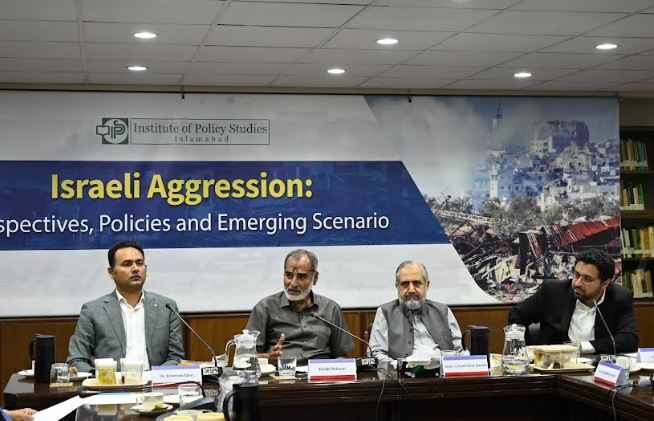ISLAMABAD, OCT 21 /DNA/ – Israel, driven by messianic ideological motives, has become hostis humani generis, an “enemy of mankind,” as it continues to impose collective punishment and apartheid in the Palestinian territories. The reality of these actions has emerged, despite the widespread disinformation in the Western media, leading to overwhelming international support for Palestinian resistance. In this context, supporting Israel or maintaining neutrality is equivalent to complicity in these crimes.
This was observed during a seminar on “Israeli Aggression: Perspectives, Policies, and Emerging Scenario” held at the Institute of Policy Studies (IPS), Islamabad. The session featured distinguished panelists, including Syed Muhammad Ali, policy analyst and strategist, Oves Anwar, director, Research Society of International Law, Dr Khurram Iqbal, associate professor, National Defense University, Islamabad, Khalid Rahman, chairman IPS, and Ambassador (r) Syed Abrar Hussain, vice chairman, IPS.
The speakers noted that Israel’s atrocities are not new and traced the origins of the Israel-Palestine conflict to early 20th century events including the Balfour Declaration and the 1948 Palestinian displacement.
From the perspective of the growing violence and devastation, the speakers emphasized that Israel’s military aggression has killed over 42,000 Palestinians since October 7, 2023, with a disproportionate number of 22 Palestinians killed for every Israeli. This degree of intentional destruction, according to the speakers, is consistent with Israeli messianic goals. These actions have bolstered Prime Minister Netanyahu’s popularity in domestic politics, which had been under pressure before the October 7, 2023, escalation, incentivizing him to prolong the war.
Regarding the forces behind Israel’s military strategy, the speakers pointed out that it is influenced more by extreme ideological motives than by political goals. They pointed out that Israel’s main objectives are to strengthen identity politics in the Middle East, take political advantage of the chaotic situation, undermine the Palestinian economy, weaken the structural and defense capabilities of resistance forces, isolate Iran, and reduce US influence in the region. They pointed out that the war is being fought in five different areas: intelligence, economics, diplomacy, military, and information.
Addressing the international dimension, the speakers noted that the conflict is likely to continue but might not expand geographically due to concerns over the global energy supply from the Middle East and the presence of reformist elements in Iran that deter geographical escalation.
Another significant evolvement is the massive public support for Hamas resistance, which is backed by a justified cause and falls under the ambit of insurgency under the international law. The extent of Israeli crimes directly fuels increased public favor and support for Palestinian resistance.
The speakers criticized the limitations of the international legal framework in addressing the ongoing conflict. They noted that Israel not only rejects international law and global institutions but also violates fundamental principles of International Humanitarian Law, such as distinguishing between combatants and non-combatants and adhering to proportionality in conflict.
Additionally, Israel relies on its own legal definitions to justify its apartheid and collective punishment. The speakers emphasized that a just international order cannot be established without holding Israel accountable.
Khalid Rahman, in his concluding remarks, noted that the ongoing situation in Gaza is part of the broader Israel-Palestine conflict, which cannot be expected to resolve quickly, especially with external dynamics involved. While the Western media has spread disinformation about Palestinians and the conflict, the evolving situation has also revealed significant truths, influencing Western youth and potentially shifting global perspectives. Resultantly, despite heavy losses, Hamas has managed to bring substantial international attention to its cause.
Rahman said supporting Israel or remaining neutral in the face of its war crimes and genocide is equivalent to complicity. Moreover, these atrocities have gone beyond the limit where current academic and legal terms could describe the extent of Israel’s inhumane policies. He emphasized that Pakistan must stay committed to its principled stance on Palestine and adjust its approach in response to changing circumstances.

















